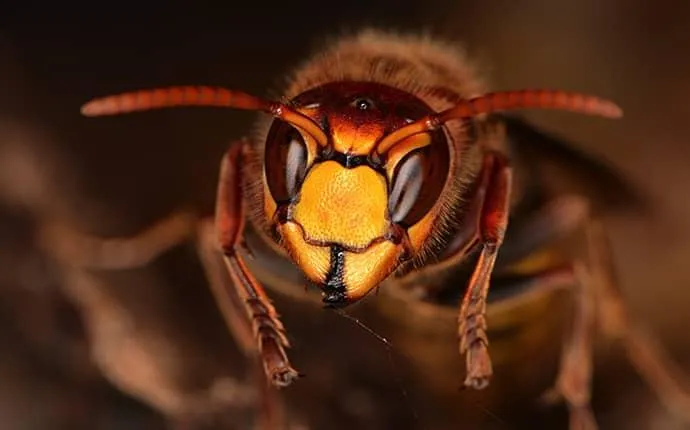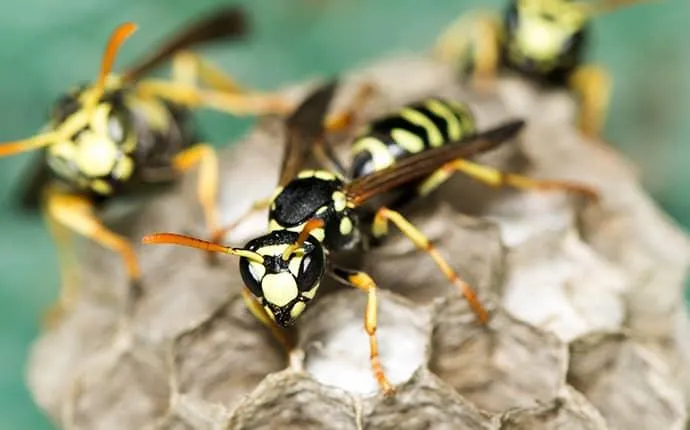How do mice get into your house? Check out the common entry points and what…

What Attracts Stinging Insects to Homes in North Carolina?
No one likes having run-ins with stinging insects - and depending on the person, a run-in could be fatal! Needless to say, it's best to not have them around. So to keep these pests off your property it’s important to understand what attracts stinging insects to your home!


Table of Contents
What Attracts Stinging Insects to Homes?
If you're looking to get rid of wasps, hornets, and bees from your property, it should start with a simple pest inspection of your property. Stinging insects, such as bees, wasps, and hornets, are often attracted to homes by a combination of environmental factors and available resources. By understanding why attracts stinging insects, you can minimize your potential for exposure or infestation.
1. Landscaping
Stinging insects are drawn to flowers; bees are important pollinators and wasps and hornets feed on the nectar from flowers. That said, your landscaping plays a crucial role in keeping away stinging insects. If you have flowers in your yard, you can expect to have visits from honey bees, bumble bees, carpenter bees, paper wasps, yellow jackets, hornets, and more.
The presence of flowering plants, especially brightly colored ones, will likely entice these insects to not only travel to your yard but to potentially call it home.
2. Sweets & Sweet Scents
But do you know that you don't even have to have flowers in your yard to attract stinging insects? It's true! If there are sweet smells in your yard, stinging insects will be curious. It could be juice left in a cup out on your deck or balcony. It might be the smell of cologne or perfume. Anything that smells sweet has the potential to attract stinging pests to your property!
3. Insects & Prey
Some stinging pests eat more than just nectar. Wasps and yellow jackets are often found feeding on protein as well, and they get a lot of this protein from feeding on other insects. So, what attracts stinging insects? Food sources!
When flies come into your yard, it attracts the spiders that eat them and when spiders come into your yard, it can attract hungry wasps. And while there aren’t any animals that eat adult wasps, some are brave enough to feed on the larvae found inside their nests. This could bring a raccoon, skunk, or other wildlife animals into your yard. These wildlife pests will also feed on the honey in beehives as well.
4. Trash
There are many food options available for stinging insects in bags of trash including both sweets and proteins. For this reason, keeping your trash stored in clean, sealed containers is a crucial step in preventing nests from being established on your property.
5. Colors & Patterns
What attracts stinging insects? Bright colors and floral patterns on your home or clothing. If your property has stinging insects, be mindful of the colors and floral patterns that you wear when spending time outdoors.
6. Moisture
An indirect attractant for stinging insects is moisture. A home that has moisture issues around its perimeter will also have pest problems as there are many pests that are drawn to dampness and pools of stagnant water. Stinging insects will seek out water sources, so leaky pipes, clogged gutters, and standing water in containers can be appealing. The wasps around your property will be drawn to your home to feed on those insects and to nest nearby.
7. Nesting Sites
What attracts stinging insects? Being a nesting ground for hives! Wasps, bees, and hornets may find suitable crevices, eaves, or other sheltered areas around your home for building their nest.
Stinging Insect Prevention: Don't Let Wasps, Hornets, or Bees Take Over
Homeowners can take proactive steps to prevent stinging insect issues around their homes.
- To minimize the attraction of stinging insects, it's essential to keep landscaping trimmed, food and garbage tightly sealed, repair any water leaks, and conduct regular inspections to identify and remove potential nesting sites.
- Regularly inspect the exterior of the home for potential nesting sites, such as cracks, crevices, and eaves, and seal these openings to deter stinging insects from establishing colonies.
- Remove overripe fruits and fallen fruits from fruit trees promptly, as they can attract these insects.
- Consider planting insect-repelling plants or relocating flowering plants away from frequently used areas to reduce their attractiveness to stinging insects.
- Keep outdoor dining areas clean and free of food residue to minimize the risk of encountering these insects during outdoor activities.
- Ensure trash containers are clean and tightly sealed.
- Contact a trusted exterminator for pest control services or bee removal.
Stinging Insect Removal Services
The effective control of stinging pests requires ongoing inspections and routine treatments that manage pest populations. If you have fewer active bugs on your property, you'll have fewer spiders, wasps, and other pests as a result.
Pest management is a complex field of study, so these inspections and treatments should be performed by a licensed professional. When applied by an educated and experienced professional, green pest control and natural control methods will be chosen first, and targeted and limited use of EPA-approved pest products will only be used where they are absolutely necessary.
A professional exterminator is also equipped to deal with the proper removal of nests. In many cases, removal can be achieved without the need for an application of insecticides. That is good news for your pets and for anyone living in your home.
Final Word: What Attracts Stinging Insects?
Are you seeing stinging insects on your North Carolina property? Reach out to us A-1 Pest Control! We have residential pest control programs that provide coverage for stinging pests as well as a variety of other pests. We'll help you get the protection you need!
A-1 is your one-stop service for all the pests you're concerned about. With our Home Shield Plus and Home Shield Complete plans, you get protection from stinging insects and vital reduction services for other dangerous pests like mosquitoes, ticks, fleas, and fire ants. To get started, reach out to us today and schedule a free home estimate!
No North Carolina home should be without a pest protection plan. Get yours in place today with A-1 Pest Control!
Related Posts
- How Do Mice Get Into Your House in North Carolina?
- Types of Termites That Infest North Carolina Homes
August 5, 2020 Termites mean trouble: A termite infestation can pretty quickly become a major…
- What Sort of Damage Do Rodents Cause?
If you have rats or mice living in your house, you need to read this…
